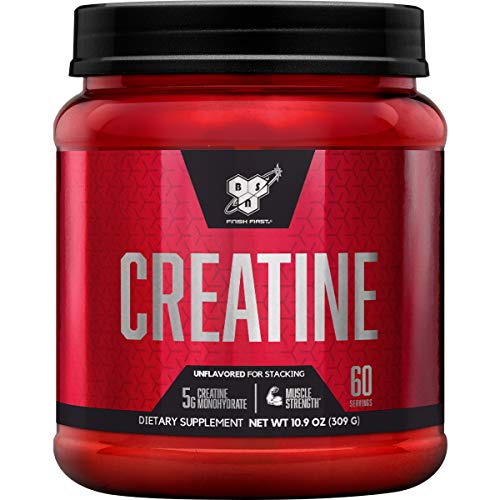
Power Up Your Performance: The Top 5 Creatine Powders of 2024
Maximize Your Potential: 2024's Definitive Guide to the Top Creatine Powders
12/02/2024 17:02:35
Creatine is a natural compound that plays a crucial role in the production of energy in muscle cells. It was first identified in 1832 by French scientist Michel Eugène Chevreul, who discovered it as a component of skeletal muscle. The name "creatine" is derived from the Greek word "kreas," meaning meat, reflecting its common source in the diet. Its history in the sports and fitness world began to take shape in the early 20th century, but it wasn't until the 1990s that creatine supplements gained significant popularity among athletes and bodybuilders for its performance-enhancing benefits.
As a supplement, creatine has been extensively researched and is widely used to improve exercise performance and increase muscle mass in athletes and bodybuilders. It works by increasing the availability of creatine phosphate in the muscle, helping to produce more ATP (adenosine triphosphate), which is the primary energy carrier in cells. This leads to improved high-intensity exercise performance, enhanced muscle recovery, and greater gains in strength and muscle mass when combined with resistance training. The popularity of creatine as a workout supplement stems from its effectiveness and the quick results it can deliver, making it a staple in many fitness enthusiasts' regimens.
Beyond its performance-enhancing benefits, creatine has also been studied for its potential health benefits. Research suggests that creatine may have neuroprotective and cardioprotective properties, possibly aiding in the prevention of certain neurological diseases and supporting heart health. Additionally, it has been investigated for its role in improving cognitive function, reducing fatigue, and aiding in the treatment of various health conditions. Despite some misconceptions, creatine is generally considered safe for most people when taken at recommended doses, making it not only an effective supplement for athletes but also a potentially beneficial addition to support overall health.
NOSSA SELEÇÃO
Creatine Powder Unflavored Creatine Monohydrate - 500g
Creatine Powder Unflavored Creatine Monohydrate - 500g 5g of Creatine per serving Helps improve traning capacity Help restore ATP pool while training Helps boost strength and performance Finest grade german creatine^Can increase strength and performance^Can help build lean mass by volumizing and hydrating muscle cellsCreatine HMB Powder by Transparent Labs - For Muscle Growth, Strength and Performance
Enhanced Strength and Power: Studies have shown that taking creatine HMB results in significantly higher lean body mass and strength gains compared to creatine monohydrate alone. The synergistic combination of creatine monohydrate and HMB in our formula lets you push harder during workouts and achieve greater gains. Superior Absorption for a Lean Physique: Transparent Labs Creatine HMB offers superior absorption compared to regular creatine monohydrate, ensuring your body can efficiently utilize the ingredients. This enhanced absorption minimizes water retention commonly associated with creatine supplementation, resulting in a leaner and more defined physique. Science-Backed Formula: Like all our sports nutrition bodybuilding supplements, Transparent Labs Creatine HMB is formulated based on scientific research, utilizing optimal dosages of ingredients to ensure maximum effectiveness and results you can trust. Clean and Transparent: We prioritize your health and fitness goals. Our product is free from artificial sweeteners, colored dyes, unnecessary fillers, and harmful additives, providing a clean supplement without compromising quality. Premium Formula with High Quality Ingredients: Transparent Labs is Informed Choice certified; we are dedicated to clean, premium ingredients with transparent formulas. Our Creatine HMB is manufactured in FDA-registered facilities, following strict GMP guidelines, and undergoes third-party testing to ensure purity, potency, and safety.Kaged Creatine HCl Powder | Unflavored | Supports Muscle Growth and Recovery | Patented Creatine Hydrochloride Formula | Easy Digestion and Enhanced Muscle Absorption | 75 Servings
SUPERIOR BIOAVAILABILITY: With superior solubility and unmatched bioavailability, Kaged Patented Creatine HCl gets to work fast. If you can’t stomach regular creatine monohydrate, or are simply looking for a way to take your training and performance to another level, it’s time you tried creatine hydrochloride. ENHANCED SOLUBILITY YOU CAN SEE: Thanks to its superior quality and solubility, our patented Creatine HCl completely dissolves in water, and is ready to drink within seconds. Unlike regular creatine monohydrate powder, our creatine hydrochloride powder leaves no sediment or wasted creatine behind. It’s pure, it’s clear, and contains absolutely no colours, artificial flavors, additives, or dyes. HIGHLY-ABSORBABLE & ULTRA PURE CREATINE HYDROCHLORIDE 750mg: If you’ve experienced GI discomfort, or your gut and stomach simply don’t agree with old-school creatine monohydrate, Creatine HCl could be the creatine solution you’ve been looking for. Each serving delivers 750mg of ultra-pure creatine hydrochloride to fuel your s. It comes with our Micropure guarantee, and like all Kaged supplements, is third-party tested for purity, and free of banned substances. EXCLUSIVE, PATENTED & PREMIUM QUALITY: Creatine HCl delivers premium quality, and its patented form is exclusive to Kaged. There is simply no other creatine hydrochloride powder or creatine hydrochloride pills like it. While the proven and strength-building power of creatine monohydrate has been a staple for athletes for decades, creatine HCl has set a new standard for lifters who are looking for a high-solubility creatine solution for their training and supplementation regimens. THE KAGED DIFFERENCE: We develop our formulas with some of the most premium, patented, and cutting-edge compounds available. After all, why train to get bigger, stronger, fitter, and healthier, but use supplements with low-quality ingredients? Kaged supplements are third-party tested for performance-minded men and women who not only want real results, but also want clean, quality products that provide incredible value for their money.Optimum Nutrition Micronized Creatine Monohydrate Powder, Unflavored, Keto Friendly, 120 Servings (Packaging May Vary)
5 grams pure creatine monohydrate per serving Supports increases in energy, endurance and recovery Maximum potency supports muscle size, strength, and power Supreme absorbency micronized to get the most out of each dose Optimum Nutrition is the World's #1 Sports Nutrition Brand. Banned substance tested - Highest quality control measures so you feel comfortable and safe consuming the productClassic Creatine - Micronized Creatine Monohydrate Powder with BioFit™- Workout Supplement for Muscle Growth, Strength, Athletic Performance & Recovery - Creatine for Men & Women - 60 Serving 5000mg
Don’t Settle for Regular Creatine: Our premium micronized creatine monohydrate powder, formulated with BioFit probiotics, sets the standard for maximizing creatine absorption, resulting in unparalleled gains in muscle mass, endurance, strength, cognitive function and energy. Boost Digestive Health with BioFit Probiotics: Our unique creatine powder, infused with probiotics, promotes a healthy gut microbiome, which plays a crucial role in creatine absorption, removing digestion discomfort and overall improved immune protection. Enhance Cognitive Function with Creatine + Probiotics: Scientifically supported, the harmonious interaction of creatine and probiotics within a healthy gut leads to improved cognitive function, boosting mental clarity and sharpness during gym activities and in daily life. Rapid Energy Boost: Experience a surge in cellular energy with our micronized creatine monohydrate with BioFit. Designed to fuel your muscles with our fast absorption formula so you can sustain energy for those rigorous workouts and daily activities. About Old School Labs: All our products are formulated in Southern California and made in the USA. Proudly supporting your fitness journey and helping you Keep it Old School!BEYOND RAW Chemistry Labs Creatine HCl Powder | Improves Muscle Performance | 60 Servings
Beyond Raw Chemistry Labs Creatine HCL - 60 Servings Enhance Strength And Performance With BEYOND RAW Creatine HCl*. BEYOND RAW Chemistry Labs Creatine HCl powder makes it possible to add micronized creatine to pre-workout drinks, BCAA, or almost any supplement in your shaker cup. If you’re training for muscle gains, creatine provides immediate support for energy during exercise and plays an important role in muscle protein synthesis*. Fuel Bigger Workouts With Fast-Absorbing Creatine HCl. PROMOTE CELLULAR HYDRATION*: Creatine helps fuel muscles and promote cellular hydration* GET PRIMED FOR GAINS*: Creatine plays an important role in muscle protein synthesis and creatine supplementation may increase the amount of stored creatine in muscles*. 2g lab-grade micronized creatine per serving Unflavored creatine powderKlean Athlete - Klean Creatine - Supports Muscle Strength, Performance, and Recovery from Strenuous Exercise* - NSF Certified for Sport - Unflavored - 11.1 oz (315 g)
Muscle Growth & Strength: Supports growth factor signaling and glycogen storage to support gains in muscle strength.* Power & Vigor: Supports quick conversion of ADP to ATP energy, which may support high-intensity sprints and dynamic movement.* Quick Recovery: Helps reduce recovery time following repeated bouts of strenuous exercise.* Klean is Clean: Klean Athlete is GMO-free and formulated without wheat, gluten or artificial ingredients. Every product is third party certified by NSF International's NSF Certified for Sport program. Fuel Your Foundation: We power health and peak performance in athletes who demand the most from themselves, their sport and their nutrition.*XEELA Creatine for Lean Muscle Gain, All Natural Creatine Powder for Men & Women with Creapure, Increase Strength & Power, Reduce Recovery Time(Unflavored, 100 Servings)
All Natural Strength & Endurance: If you want to see big changes in your physique, you have to get stronger over time. Creatine is the single most proven ingredient for this purpose. Creatine is by far the most researched supplement in the fitness industry. There is a lot of misinformation about Creatine out there; so we've taken it upon ourselves to bust these myths and tell you the truth about Creatine (and why you should start taking it right now!) Benefits of Xeela Creatine: Increase lean muscle mass and strength. Decrease recovery time and lactic acid. Promote brain and bone health. So, why should you take Creatine? The answer is simple: it has no downsides, and many potential benefits. Whether you’re trying to get lean or build muscle, Creatine can and will speed up your progress significantly. Creatine is a molecule used by your muscles to produce energy. Your body absorbs it from the foods you eat and feeds it to your muscles to use as fuel. Food sources for Creatine are very limited, however. It's predominantly found in red meat but in very low amounts. (To put it into perspective, you’d have to eat over a pound of red meat a day to see any improvement.) Even meat lovers can admit that’s a lot. XEELA is a brand made for you and all your health goals. We are here to get you in the best shape of your life, and help you stay there! All of our products are 100% vegan-friendly and of the highest quality. We are so excited to help guide your health and fitness needs through our products, our workout programs, and our nutrition guides!Creatine Monohydrate Powder Micronized PreWorkout Recovery Supplement | Support Muscle Building Strength Training Cognition | Vegan & Keto Friendly Easily Mixes (60 Serving) Unflavored Active Creatine
Our quality Active Creatine is everything you need to boost your focus, build your muscles, and increase your energy. Grow your muscles. Grow your strength. Creatine can boost brain function, help with exercise performance, and accelerate muscle growth. Creatine provides a continuous supply of energy to the body’s muscles, building muscles and aiding muscle repair. Naturally found in muscles, creatine produces energy, allowing you to harness your potential with muscle gains, amplified strength, and greater cognition so you can think on your feet for every jump and mile. Our quality Active Creatine is everything you need to boost your focus, build your muscles, and increase your energy. Research shows supplementing with creatine can improve your strength and lean muscle gains when compared to training alone. Quality Creatine boosts your focus, builds your muscles, and increases your energy. It helps build muscle, aids in muscle recovery, and provides energy for a stronger workout. Creatine is one of the best supplements for improving strength and high intensity exercise performance. It works by increasing your capacity to produce ATP energy. Creatine is one of the best supplements for improving strength and high intensity exercise performance. It works by increasing your capacity to produce ATP energy. Sunwarrior’s top priority is providing the cleanest, highest-quality ingredients in our products. We take your lifestyle seriously with no synthetics, no fillers, and absolutely no animal products. We utilize an ISO-Certified, third-party lab to conduct all our heavy metals and micros testing.CON-CRET Creatine HCl Powder | Supports Muscle, Cognitive, and Immune Health | Unflavored Creatine (64 Servings)
CON-CRĒT Creatine HCl (Creatine Hydrochloride) is 7X Concentrated vs Creatine Monohydrate. Provide cellular energy to all your cells to support Muscle Health, Cognitive Function, Immune Support, and Heart Health. Creatine HCl with its superior solubility and absorption allows smaller doses while maintaining effectiveness and provides all the benefits of creatine without the negative side effects such as bloating, stomachaches, muscle cramps and water retention. Creatine helps your cells function optimally with more energy. Think of creatine as a turbocharger for your cells, giving them more power when needed. Creatine has been a trusted tool for athletes for decades, but it's advantages for way beyond the gym. Discover the benefits of this time tested supplement and elevate your everyday wellness. Discover the benefits of creatine for women and men alike. CON-CRĒT Creatine is made in the USA at our SQF, GMP, NSF certified facility. We are committed to providing innovative and science-backed products every-body needs for optimal health and wellness.MuscleTech Cell-Tech Creactor Creatine HCl Powder | Post Workout Muscle Builder for Men & Women | Creatine Hydrochloride + Free-Acid | Unflavored (120 Servings)
CREATINE POWDER – MuscleTech Cell-Tech Creactor is engineered with ultra-pure ingredients, including free-acid creatine with absolutely zero fillers, carbs or fats MUSCLE BUILDER – The amount of creatine found in just two super-concentrated scoops of Cell-Tech Creactor is scientifically proven to increase muscle strength, size and performance FASTER MUSCLE RECOVERY – This formula rapidly enhances your muscle cells’ ability to regenerate ATP – their primary source of anaerobic energy – so you can recover faster between sets STACKS WITH OTHER WORKOUT SUPPLEMENTS – Cell-Tech Creactor delivers ultra-pure and free-acid creatine – so you can avoid stomach bloating and never have to load or cycle it. Stacks well with other proteins, BCAAs and pre workouts DAILY WORKOUT SUPPLEMENTS – Mix 1 scoop with 6 to 8 oz of water or mix 2 scoops with 12 to 16 oz of water. Take 2 scoops daily. Drink 8 to 10 glasses of water daily for general good healthBSN Micronized Creatine Monohydrate Powder, Unflavored, 2 Months Supply-60 Servings, 10.9 ounce
Support lean muscle mass: Help you get the most out of your workout Product Note: Exposure to heat or sunlight may lead to melting/damage of product. Hence customers are expected to be available during the product delivery Support strength & power: Aid in the ability to push heavy weight Support performance – help take your training to the next level 5 gram of Creatine monohydrate per serving – the industry standard of recommended intake Easily mixes in liquid – micronized to dissolve quickly During the summer months products may arrive warm but Amazon stores and ships products in accordance with manufacturers' recommendations, when provided.EFX Sports Kre-Alkalyn EFX Powder | pH Correct Creatine Monohydrate Powder Supplement | Strength, Muscle Growth & Performance | 66 Servings (Unflavored)
MULTI-PATENTED PH-CORRECT CREATINE by Dr. Jeff Golini: Kre Alkalyn EFX offers a superior alternative to other creatine products. Traditional creatine supplements have pH levels below 7, which immediately begin converting to creatinine — a useless waste product — when mixed with a solution. Kre Alkalyn EFX, however, has a multi-patented pH range of 12-14, resulting in a buffered, stable creatine monohydrate. This means you only need 1.5-3 grams with no loading, no bloating, and no side effects! CRUSH YOUR STRENGTH GAINS: Creatine monohydrate is the single most studied sports supplement ever. It’s the top pre- and post- workout compound for athletes and bodybuilders who want to gain muscle mass, increase power, enhance performance, and accelerate muscle recovery. Kre Alkalyn EFX is 99.9% pure creatine monohydrate—science-backed, clinically tested, and safe. MIX & ENJOY: Our Kre Alkalyn EFX creatine powder easily mixes in water or your favorite drink for maximum strength and performance, no matter your fitness goals. Try one of our delicious fruity flavors or enjoy the classic unflavored powder before or after any intense training session. Just scoop, mix, and get to work! MANUFACTURED IN-HOUSE: EFX Sports is part of a very small, elite group of brands who actually make their own products. That’s why we guarantee Kre Alkalyn EFX always meets label claims and is 100% banned-substance free (certified by Informed Sport). With any EFX Sports product, you'll know that you're getting a pure, potent, and safe product. 3X QUALITY TESTING: At EFX Sports, we proudly own every phase of the manufacturing process to ensure what's on the label is what's in the bottle...without question. In fact, every EFX Sports product must pass 3 critical quality checkpoints—before, during and after production.CRITÉRIOS
POSTS RELACIONADOS
POSTS RECENTES
CATEGORIAS
DISCLAIMERS
- Consult a healthcare professional before consuming any type of food, supplement or vitamin.
- Selektz may receive commissions for sales made through links published on our pages.


















